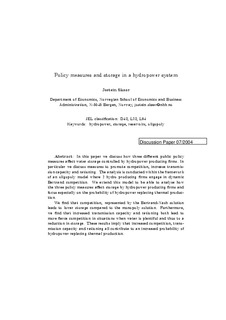| dc.contributor.author | Skaar, Jostein | |
| dc.date.accessioned | 2006-08-03T07:10:47Z | |
| dc.date.available | 2006-08-03T07:10:47Z | |
| dc.date.issued | 2004-02 | |
| dc.identifier.issn | 0804-6824 | |
| dc.identifier.uri | http://hdl.handle.net/11250/162884 | |
| dc.description.abstract | In this paper we discuss how three different public policy
measures affect water storage controlled by hydropower producing firms. In
particular we discuss measures to promote competition, increase transmission
capacity and rationing. The analysis is conducted within the framework
of an oligopoly model where 2 hydro producing firms engage in dynamic
Bertrand competition. We extend this model to be able to analyse how
the three policy measures affect storage by hydropower producing firms and
focus especially on the probability of hydropower replacing thermal production.
We find that competition, represented by the Bertrand-Nash solution
leads to lower storage compared to the monopoly solution. Furthermore,
we find that increased transmission capacity and rationing both lead to
more fierce competition in situations when water is plentiful and thus to a
reduction in storage. These results imply that increased competition, transmission
capacity and rationing all contribute to an increased probability of hydropower replacing thermal production. | en |
| dc.format.extent | 201481 bytes | |
| dc.format.mimetype | application/pdf | |
| dc.language.iso | eng | en |
| dc.publisher | Norwegian School of Economics and Business Administration. Department of Economics | en |
| dc.relation.ispartofseries | Discussion paper | en |
| dc.relation.ispartofseries | 2004:7 | en |
| dc.subject | hydropower | en |
| dc.subject | storage | en |
| dc.subject | reservoirs | en |
| dc.subject | oligopoly | en |
| dc.title | Policy measures and storage in a hydropower system | en |
| dc.type | Working paper | en |
